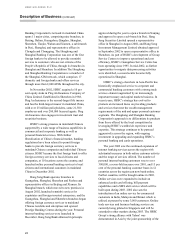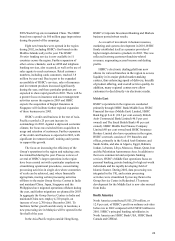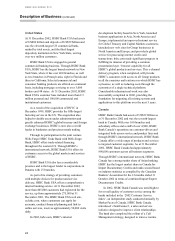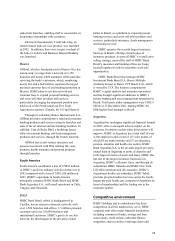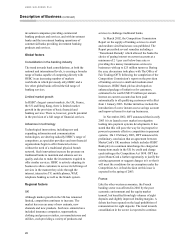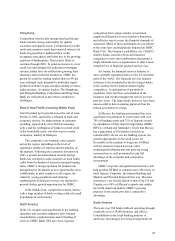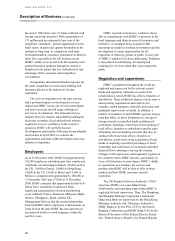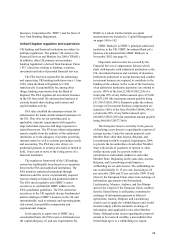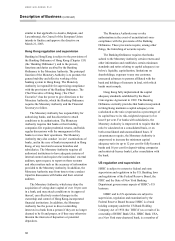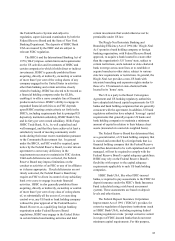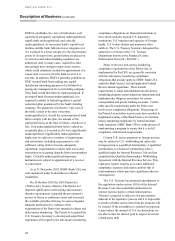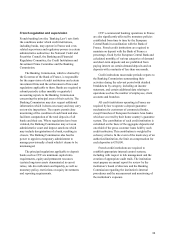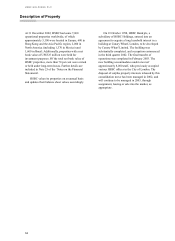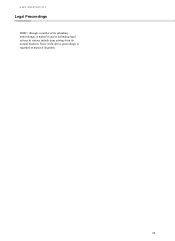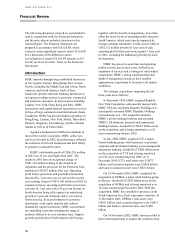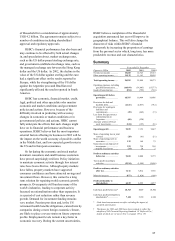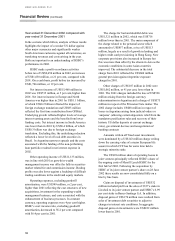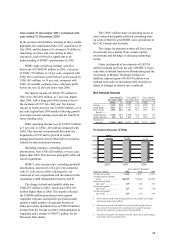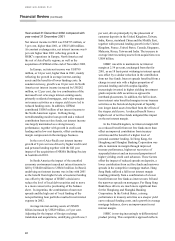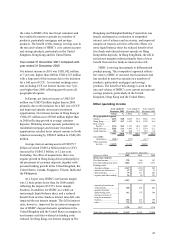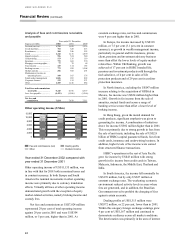HSBC 2002 Annual Report Download - page 34
Download and view the complete annual report
Please find page 34 of the 2002 HSBC annual report below. You can navigate through the pages in the report by either clicking on the pages listed below, or by using the keyword search tool below to find specific information within the annual report.
HSBC HOLDINGS PLC
Description of Business (continued)
32
FDICIA establishes five tiers of institutions: well
capitalised; adequately capitalised; undercapitalised;
significantly undercapitalised; and critically
undercapitalised. As an insured bank’s capital level
declines and the bank falls into lower categories (or
if it is placed in a lower category by the discretionary
action of its supervisor), greater limits are placed on
its activities and federal banking regulators are
authorised (and, in many cases, required) to take
increasingly more stringent supervisory actions,
which could ultimately include the appointment of a
conservator or receiver for the bank (even if it is
solvent). In addition, FDICIA generally prohibits an
FDIC-insured bank from making any capital
distribution (including payment of a dividend) or
paying any management fee to its holding company
if the bank would thereafter be undercapitalised. If
an insured bank becomes undercapitalised, it is
required to submit to federal regulators a capital
restoration plan guaranteed by the bank’s holding
company. The guarantee is limited to 5 per cent of
the bank’s assets at the time it becomes
undercapitalised or, should the undercapitalised bank
fail to comply with the plan, the amount of the
capital deficiency at the time of failure, whichever is
less. If an undercapitalised bank fails to submit an
acceptable plan, it is treated as if it were significantly
undercapitalised. Significantly undercapitalised
banks may be subject to a number of requirements
and restrictions, including requirements to sell
sufficient voting stock to become adequately
capitalised, requirements to reduce total assets and
restrictions on accepting deposits from correspondent
banks. Critically undercapitalised depository
institutions are subject to appointment of a receiver
or conservator.
As at 31 December 2002, HSBC Bank USA was
well capitalised under Federal Reserve Board
regulations.
On 26 October 2001 the USA Patriot Act
(‘Patriot Act’ ) became effective. The Patriot Act
imposed significant record keeping and customer
identity requirements, expanded the government’s
powers to freeze or confiscate assets and increased
the available penalties that may be assessed against
financial institutions for violation of the
requirements of the Patriot Act intended to detect and
deter money laundering. The Patriot Act required the
U.S. Treasury Secretary to develop and adopt final
regulations with regard to the anti-money laundering
compliance obligations on financial institutions (a
term which includes insured U.S. depository
institutions, U.S. branches and agencies of foreign
banks, U.S. broker-dealers and numerous other
entities). The U.S. Treasury Secretary delegated this
authority to a bureau of the U.S. Treasury
Department known as the Financial Crimes
Enforcement Network (‘FinCEN’ ).
Many of the new anti-money laundering
compliance requirements of the Patriot Act, as
implemented by FinCEN, are generally consistent
with the anti-money laundering compliance
obligations that already apply to HSBC Bank USA
under the Bank Secrecy Act and applicable Federal
Reserve Board regulations. These include
requirements to adopt and implement an anti-money
laundering program, report suspicious transactions and
implement due diligence procedures for certain
correspondent and private banking accounts. Certain
other specific requirements under the Patriot Act
involve new compliance obligations. The passage of
the Patriot Act and other recent events have resulted in
heightened scrutiny of the Bank Secrecy Act and anti-
money laundering compliance by federal and state
bank examiners. HSBC Bank USA is in the process of
implementing a program to ensure that it is in full
compliance with all such requirements.
Certain U.S. source payments to foreign persons
may be subject to U.S. withholding tax unless the
foreign person is a qualified intermediary. A qualified
intermediary is a financial intermediary who is
qualified under the Internal Revenue Code and has
completed the Qualified Intermediary Withholding
Agreement with the Internal Revenue Service. This
regulatory regime requires us to incur additional
compliance expenses and creates another risk of
noncompliance which may have significant adverse
consequences.
The U.S. Treasury has proposed amendments to
the regulations under section 163(j) of the Internal
Revenue Code that would limit deductions for
interest expense paid to certain related parties.
Treasury’s proposal is subject to the uncertainties
inherent in the legislative process and it is impossible
to predict whether and in what form the proposal will
be enacted. If the amendment is enacted as proposed,
it may reduce the amount of U.S. tax deductions we
are able to take for interest paid in respect of certain
related-party debt.


